|
TRANSLATE THIS ARTICLE
Integral World: Exploring Theories of Everything
An independent forum for a critical discussion of the integral philosophy of Ken Wilber
 David Christopher Lane, Ph.D.
Professor of Philosophy, Mt. San Antonio College Lecturer in Religious Studies, California State University, Long Beach Author of Exposing Cults: When the Skeptical Mind Confronts the Mystical (New York and London: Garland Publishers, 1994) and The Radhasoami Tradition: A Critical History of Guru Succession (New York and London: Garland Publishers, 1992). David Christopher Lane, Ph.D.
Professor of Philosophy, Mt. San Antonio College Lecturer in Religious Studies, California State University, Long Beach Author of Exposing Cults: When the Skeptical Mind Confronts the Mystical (New York and London: Garland Publishers, 1994) and The Radhasoami Tradition: A Critical History of Guru Succession (New York and London: Garland Publishers, 1992).
THE AGNOSTICS
Thinkers in an Indeterminate Cosmos
Introduction |
Isaiah Berlin |
Charles Darwin |
John Dewey |
Enrico Fermi |
David Hume |
Edmund Husserl |
Thomas Henry Huxley |
Thomas Kuhn |
Lynn Margulis |
John Maynard Keynes |
G.E. Moore |
Karl Popper |
Michael Schmidt-Salomon |
Herbert Spencer |
Leo Szilard
DAVID HUMENicole Cobar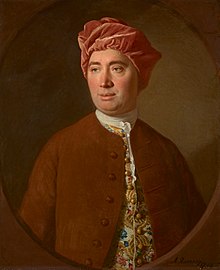 David Hume If you have ever been really upset, you might have been told to, “calm down,” and therefore being forced to suppress your emotions, instead of experiencing them fully, or talking about them with someone else. The world we live in tends to embrace reason and logic, and shun the overly emotional. However, eighteenth-century philosopher David Hume embraced emotions and questioned reason, even doubting most of what passed as human knowledge. Without a doubt, David Hume is one of the most well-known philosophers of his century. The Scottish writer was also a historian, economist, and essayist. He influenced another great philosopher at that time, Immanuel Kant, and the French sociologist and mathematician Auguste Comte who later developed positivism. Hume is famous for being a skeptic. Skepticism is a school of thought in which philosophers question the certainty of knowledge. This school of thought questions all of human knowledge, leading to new conclusions on morality, ethics, religion, reason, and the idea of the self. Hume became very well known for questioning commonly held beliefs. One very popular belief that Hume questioned was the concept of personal identity; he doubted the idea of a core self. Instead, Hume thought that a person is not something that could be easily defined, but rather was a combination of perceptions. Hume said, “We are nothing but a bundle of perceptions, which succeed each other with an inconceivable rapidity, and are in perpetual flux and movement.” This means that, according to Hume, people are not set,and defined, but rather are ever-changing based on how others perceive us, which can change with new ideas in morals and ethics. The problem of induction is an idea that has to do with the grounds on which we come to our beliefs, particularly about the basis of inductive inferences. Inductive inference is a process of reasoning where generalizations are made based on observations. This type of reasoning is seen a lot in science, where there is data and conclusions are drawn based on the data. Hume argued that humans are prone to inductive reasoning. We assume that because every fire we have touched is hot, this means that all fires we will ever touch will be hot. We assume that the Earth will continue to revolve around the sun. Hume argues that making an inductive argument is merely a point of assumption by which to predict future events. When it comes to fires being hot, or Earth revolving around the sun, these are generally considered good arguments because of predictive consistency. However, we carry this with us into other areas of life, where inductive reasoning makes less sense. For example, you are given a bag of coins, and pull three coins out of the bag. Each coin you pull is a penny. Based on the fact that you have pulled only pennies from the bag, you might assume that the bag is filled with only pennies, and expect to pull a fourth penny from the bag. While it makes sense to assume, based on past experience, that you will pull a fourth penny from the bag, there is no way of truly knowing; you cannot be certain. This is Hume's problem with induction. If humans always use induction to come to conclusions, then there is little certainty in our conclusions. We assume the sun will rise tomorrow morning, as it has risen every morning previously, but Hume argues that there is no way of being one hundred percent certain that the sun will rise tomorrow morning. We all just assume that it will. With his problem of induction, Hume questions the certainty of most of human knowledge. This concept has been highly influential to the philosophical school of thought, skepticism. It has also, ironically, been a linchpin in scientific fields which always have an underlying sense of uncertainty and tentativeness. Interestingly, this is precisely how and why science can make progress since it never assumes anything absolutely. Hume lived during a time called the Age of Reason, when many thinkers celebrated reason, believing it was the thing that made humans exceptional. Hume, however, thought that it was feelings, not reason, that makes humans exceptional. Hume believed that humans act, think, and believe based on emotions, or as he referred to them, passions. Hume even thought that schools needed to be restructured to teach the education of passions, which addresses feelings rather than reason. In education of passions, students learn to be more patient with themselves, and less afraid of others. Hume thought it was important to learn how to feel our passions, saying, “Reason is, and ought to be the slave of the passions.” This means that even the way we reason is secondary to our passions, meaning we feel first and think second, thinking only to find support for our feelings. Hume even argued this for ethics, suggesting that ethics are based on emotion and sentiment, rather than reason, abstract moral principle, or a higher moral power. This is why David Hume is considered an agnostic because he believed, fundamentally, that a belief in God is based on emotions, not reasons, so to try and reason the existence of a god would miss the point of the argument altogether. This also led Hume to become a great supporter of religious tolerance, because he believed that those who practiced a different religion did not make an error in reasoning, but rather, were driven by their emotions to practice that particular religion. Hume believed to let everybody do as they pleased, as long as they let others do the same. In his thoughts about religion, Hume is a sort of naturalist, believing that morality didn't have any religious foundations, but rather that humans are programmed with a certain human nature and human feelings that dictated their ideas of right and wrong. He believed it is this human nature that enabled people to feel, think, and act independently from the truth or reason. Although Hume himself doubted the existence of a god, he still found value in religion and other ideas that are “irrational.” Combining Hume's ideas of the problem of induction and our innate human nature, he believed that most of what humans do anyway is irrational, but still, they are justified, because they help us make sense of the world around us. It would be common sense to keep a belief that was useful. David Hume (1711-1776) was born in Edinburgh, Scotland, United Kingdom. Because both sides of his parents were involved in practicing law, Hume considered pursuing a career on the same path. However, the Scottish young man became interested in philosophy and general learning and adopted a significant disrespect for professors. He considered that there is nothing that can be learned from a professor,that you cannot find in a book. Hume rejected traditional academics, claiming that long lectures and academic jargon are not the way to communicate with most people. Hume learned this the hard way after his first book failed to sell or make much of an impact. Afterward, he began to write for every man. For Hume, he wasn't interested in reasoning everything into oblivion. He also did not put himself on an intellectual pedestal. Hume was frequent at dinner parties and spent much of his time with all sorts of people. For Hume, philosophy was not an intellectual competition, but rather a way to make sense of the world. Hume remains influential and was widely popular because Hume appealed to every person, not just the academic pseudo-intellectuals. Hume is a remembered philosopher because he celebrated the wisdom of the uneducated and championed common-sense ideas. The following judicious quotes provide a glimpse and a flavor of Hume's thinking: “Generally speaking, the errors in religion are dangerous; those in philosophy only ridiculous.” “Most fortunately it happens, that since Reason is incapable of dispelling these clouds, Nature herself suffices to that purpose, and cures me of this philosophical melancholy and delirium, either by relaxing this bent of mind, or by some avocation, and lively impression of my senses, which obliterate all these chimeras. I dine, I play a game of backgammon, I converse, and am merry with my friends. And when, after three or four hours' amusement, I would return to these speculations, they appear so cold, and strained, and ridiculous, that I cannot find in my heart to enter into them any farther.” “It is an absurdity to believe that the Deity has human passions, and one of the lowest of human passions, a restless appetite for applause” “Reason is, and ought only to be the slave of the passions, and can never pretend to any other office than to serve and obey them.” “Does a man of sense run after every silly tale of hobgoblins or fairies, and canvass particularly the evidence? I never knew anyone, that examined and deliberated about nonsense who did not believe it before the end of his enquiries.” “...no testimony is sufficient to establish a miracle, unless the testimony be of such a kind, that its falsehood would be more miraculous, than the fact, which it endeavors to establish.” “The identity that we ascribe to things is only a fictitious one, established by the mind, not a peculiar nature belonging to what we're talking about.”
Further Reading:An Enquiry Concerning Human Understanding The Natural History of Religion 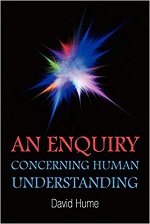 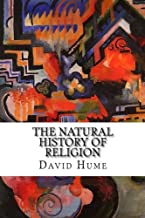 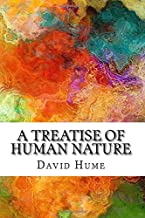
FROM THE INTRODUCTION | DAVID LANE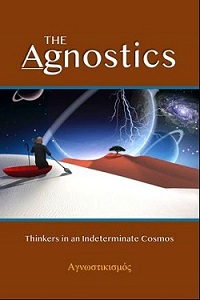
Often in the philosophy classes I have taught in undergraduate and graduate school, I would bring up this point of “unknowingness.” Pointing to a crumpled piece of writing paper, I would ask the class, “What is this?” Almost in unison, the students would respond, "A piece of paper." Taking this as my cue to lead into a deeper philosophical investigation of materialism, I probed further, "Yes, but what is that?” Catching my drift, one student invariably answered, “Oh, it is actually a transformed sheet of wood.” Not wanting them to stop there, I asked, “And wood is made of what?” “It's comprised of molecules," the more scientifically oriented students would shout. Connecting to the now forgotten inner space ride at Disneyland, which takes one through an imaginary voyage inside a snowflake molecule, I queried, “But what is a molecule made of.” By this time, we had gotten down to the subatomic level, and our words began to betray our modicum of knowledge (electrons, protons, quarks, lucky charms, superstring). The final question I asked was quite simple, but given the line of investigation it led to some severe complications: What is matter? Well, it should be obvious to the reader as it was to my class and to myself that there's only one truly appropriate response, “I don't know.” Now, this is exactly the response not only of most mystics, but most quantum physicists as well. As Sir Arthur Eddington, the distinguished astronomer put it, “Something unknown is doing we don't know what!” To be sure, mystics have said that the world (or matter) is nothing but consciousness. But, what is consciousness? Not even a sage as enlightened as Ramana Maharshi of South India could answer that question. To such queries, Ramana would often sit in silence. Ultimately, matter leads to consciousness and consciousness to God or Nature (with a capital N) and both to Mystery. However, no matter how you define it, slice it, categorize it, blend it, intuit it, the fact remains that Reality is a Mystery, and nobody apparently (not me, not you, not Einstein) knows what that Reality is. We are sitting right in the middle of the Mystical Dimension.
Comment Form is loading comments...
|